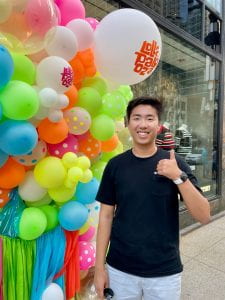Jason Yang

Please provide a brief summary of your research.
The sense of touch is critical for humans, and our daily interactions with objects require accurate tactile perception. To better understand the associated neural processes, functional magnetic resonance imaging (fMRI) during tactile stimulation can identify how tactile signals travel within the central nervous system. However, there is a lack of stimulators that provide constant forces resembling the natural grip forces used in object manipulation. We developed a novel system that delivers accurate, localized, and automated constant-force stimulation that can be used in studies of tactile perception in various populations, such as those with stroke.
What made you initially interested in researching your project in particular?
I have always had an interest in the technology behind medical imaging, and I find it fascinating that we have the capability to see within the body. When I joined the Robotics and Sensorimotor Control Lab, which was focused on researching how humans perceive somatosensory signals, I wanted to integrate neuroimaging into the study of tactile perception. My PI and I worked together to develop a new research direction utilizing fMRI to study the neural correlates of tactile perception.
What made you interested in pursuing (interdisciplinary) research more broadly?
I enjoy trying to tackle complex challenges on the forefront of a particular topic, and I find it rewarding that my work will eventually have a real impact on people around the world. I also love the interdisciplinary aspect of research and being exposed to so many different industries and fields. Collaborators on my project included roboticists, mechanical engineers, computer scientists, neuroscientists, and more!
Describe your experiences with research thus far. Was it tricky? What skills do you think you’ve gained?
Over the 2-3 years that it took to complete my research, there were certainly some challenges. I think the hardest part was trying to coordinate the different components of the project and ensuring that each team knew what the end goal was. I definitely developed skills in effective communication and delegation. Also, while it was daunting at first, I found it especially rewarding to be able to work and make decisions independently. My experience with research has certainly prepared me for working in the “real world.”
Any tips or advice you have for students similar to you that are interested in pursuing undergraduate research?
I would say to find something you are truly interested in, especially if you plan on starting a project and following through with it to the end. On this point, I think finding a lab or PI that allows you to take control over a project is especially important. Being able to go through the whole “scientific method” was the best way for me to develop my research skills.
If you had unlimited time, money, resources, support, etc. what is something you would research?
How to cure color blindness (I’m color blind…)
Favorite bathroom on campus?
First floor of Bienen
